We all love deep-fried food. Especially in winter, they just are a heavenly treat for us. But you might also be aware of the negative impact deep-fried food has on our health. Deep frying frequently might lead you to question whether or not you are using the right oil or not or if vegetable oil is a good option. This article will shed light on the answer to help you decide what oils are best for deep frying and whether you can deep fry with vegetable oil or not!
Can you deep fry with vegetable oil?
Yes, you can safely use vegetable oil for deep frying. It is preferred by many nutritionists as a healthier option. Regarding vegetable oils, there are a lot of options such as olive oil, corn oil, or sunflower oil that you can use to deep fry foods.
Often vegetable oil we use is a blend of several different plant-derived oils. Furthermore, vegetable oils do not have a lot of flavors which makes them even more preferable for deep frying.
How do you decide what oil to use for deep frying?
There are a couple of factors you will need to look at when choosing an oil for deep frying. These factors make your oil more stable. They are as follows:
1. Smoke point
It is the temperature at which your oil will burn and smoke up. Vegetable oils have a higher smoke point than other oils. You might have seen how some oils while cooking or frying, catch on fire. This is very dangerous. You do not want a fire in your kitchen every time you deep fry something. Since deep frying usually occurs at a really high temperature, it is best that you use vegetable oils as they are considerably resistant to heat and can tolerate high temperatures without catching on fire.
2. Type of fat content
Saturated fat and monounsaturated fat oils are generally more stable in terms of withstanding heat. So, they are a good option for deep frying. If your oil contains a considerable quantity of polyunsaturated oils, then it is not preferable for frying as it cannot withstand a lot of heat and is unstable. The stability refers to its ability to react with oxygen.
3. Flavor
Another thing you should keep in mind when deciding on an oil to deep fry anything in is the flavor. Some cooking oils have a strong flavor. While this may be acceptable for cooking or in salad dressings, however, for deep frying the oil should preferably lack flavor. Vegetable oils do not have a lot of flavors and even if they do, usually when they are heated, they lose their flavor.
4. Cost
The costs of oils also need to be kept in mind for deep frying. I am suggesting this because deep-frying requires a considerable quantity of oil and you do not want to spend too much money on oil nor would you want to keep reusing the same oil for deep frying.
What are good options for oils to use for deep frying?
Keeping in mind the high content of saturated fats, the smoke point, and the flavor, oils such as coconut oil, olive oil, and canola oil are your safest options. If you want to explore animal fat oils, then ghee, tallow, and lard are your safest bets. The options are detailed as follows:
1. Coconut oil
Coconut oil, although not vegetable oil, has a high content of saturated fats and thus is stable and also has a higher smoke point. This enables it to withstand high temperatures without burning, which is of significance when frying. You can use it for deep frying instead of vegetable oil.
2. Olive oil
Good options in vegetable oils include olive oil. It is considered one of the healthiest options for deep frying. It is resistant to high temperatures and has a high smoke point.
3. Canola oil
Canola oil is also considered a great option for deep frying because of its neutral taste and high smoke point.
Other options
Ghee, tallow, and lard can be used for deep frying as well but they are derived from animal fats.
What oils NOT to use
According to some articles, oils such as soybean oil, avocado oil, etc. are not good for deep frying as they have a high content of polyunsaturated oils.

How safe is reusing frying oil?
It is safe to reuse oil for frying a couple of times, but you should know when to throw it out and opt for a fresh batch. On countless occasions, you might have decided to recycle your oil a couple of times, which is okay as deep frying can be expensive. How many times you can reuse it depends on the kind of food you are frying.
For example, if it has a batter, is very crumbly, or is kind of wet, you should not use the oil more than two or three times. If you use it for frying cleaner food items such as plain potato chips or something like that, then you can use it four or five times.
If you are frying something like fish, you should only use it once preferably, and if you must use it again, do not fry anything other than fish. This is primarily because of the smell of fish. After frying fish in it, your oil will also smell similar to the fish and you do not want that in other food items. It might be safe to use it again but we will advise against it.
To make your oil reusable more than once or twice, filter it out every time it cools down after deep frying. This will help you get rid of any crumbs in the oil.
How to tell if you cannot further reuse your oil?
There is a limit till you can reuse your oil for deep frying, after which you should not. Every time you heat your oil, it breaks down and is extremely bad for your health. If your oil has changed color and has become cloudy, it is indicative of the fact that you should change it. Every time you reheat it, it will darken slightly but once it becomes too dark, you should not further use it.
If your oil has a lot of crumbs and is messy, it is best to change it. Another key factor is that your oil thickens as you keep reusing it. If your oil no longer possesses its original texture, it is time to throw it out. Your oil might form a layer on top or have a strange smell which also suggests that it is time to change it.
What can I do with leftover frying oil?
Follow the steps below if your oil is still reusable:
STEP 1: Let the oil cool
Let your oil cool down completely before you do anything. Hot oil can be very dangerous.
STEP 2: Filter the oil
Once it has completely cooled off, filter it with a strainer to get rid of any crumbs or impurities that are filterable. If you leave crumbs and other impurities in your oil that you plan on reusing, it will start tasting different and a little bitter.
STEP 3: Separate your oils
Keep oils that you use for frying different items in a separate container. Such as; do not mix the oil you used for frying fish as it will not be reusable for any other item.
STEP 4: Store them
Store in an airtight container, in a cool and dry place.
How to reuse leftover oil?
We suggest that you discard the frying oil after using it multiple times but if you really do want to reuse it then you can utilize it for cooking as long as it has not considerably darkened in color or its viscosity hasn’t changed much. These are indicators of bad oil which is potentially harmful. So, just use this oil for cooking but go for new and fresh oil for salad dressings, toppings, and marinades.
Can you mix two different vegetable oils for deep frying?
Yes, it is safe to mix vegetable oils for deep frying, keeping in mind that they have similar smoke points and are neutral in taste. Deep frying requires a large amount of oil so if you are short on one type of oil, you might want to mix another one in it.
As long as you keep in mind that the one you are adding is vegetable oil similar to the one you are using, you should be good to go. Vegetable oils are already a mixture of plant-derived oils.
Wrapping up my thoughts on can you deep fry with vegetable oil!
Deep-fried food is often our comfort food such as fried chicken, fried potato chips, donuts, and whatnot. Using vegetable oil is a healthier option for deep frying because of several reasons as we have mentioned in the article. While deep frying is not great for your health, we all still love and eat these treats every once in a while.
Why not use vegetable oil which is better than other types of cooking oils, at the very least? We hope that this article proves helpful and informative to you and answers your deep frying queries!



